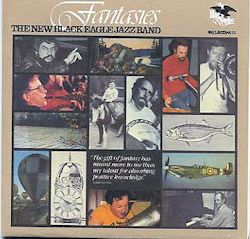1. 1919 March
2. Rent Party Blues
3. Keyhole Blues
4. Chicago Breakdown
5. Song of Songs
6. When I Grow Too Old to Dream
7. Indian Summer
8. Black & Tan Fantasy
9. Kansas City Stomps
10. Egyptian Fantasy
11. Le Marchand de Poisson
12. Delia’s Gone
13. Sweetie Dear & When It’s Sleepy Time down South
Recorded at the Opera House, Wilmington, DE, on Mar. 23, 1979 (tracks 1 through 5) and Mt. Holyoke College, South Hadley, MA, on Oct. 12, 1979 (tracks 6
through 13).
Tony Pringle – Cornet and leader
Stan Vincent – Trombone
Stan McDonald – Clarinet and soprano sax
Bob Pilsbury – Piano
Peter Bullis – Banjo and manager
“Pam” Pameijer – Drums
Eli Newberger – Tuba and finger cymbals
This is the thirteenth in a series of fourteen limited edition CD’s, reissuing material by the band that previously appeared on LP’s—mainly on their own
label but also on a few other small labels, such as Philo, Philips, and Dirty Shame—and on cassette tapes. Some of these cassettes were issued
simultaneously with the LP’s but also contained additional tracks. Other cassettes with different material were issued in that format only. When the
company that produced the cassettes went out of business, the digital masters were returned to the band. These form the basis of most of the material on
this CD set.
In this the penultimate disc in the set, the New Black Eagles’ tune list demonstrates once again that their versatility is broad and their taste catholic.
The composers represented are as diverse as Duke Ellington, Sidney Bechet, Jelly Roll Morton, Sigmund Romberg, and Victor Herbert, among others, the
compositions of the latter two not usually found in the jazz lexicon. The tune list is not replete with tired standards but rather with tunes seldom heard
and just about perfectly executed. The musicianship is, as it always seems to be, outstanding—witness, for example, the performance of Jelly Roll Morton’s Kansas City Stomps, a tricky tune (as all of Morton’s are). The band makes it look easy, yet there is strict discipline needed to render the
stop-time breaks we hear.
In addition to that displayed in the tune list, variety in other areas further add to the interest the band’s performance elicits. The group is not content
to follow the formula to which so many—perhaps even the majority—of bands in the genre subscribe, namely opening ensemble chorus / string of solos /
closing ensemble chorus. Coupled with that formula, many bands also follow the same pattern in the solos, invariably beginning with clarinet. The New Black
Eagles eschew both. Opening often with several ensembles choruses, they sprinkle ensembles among the solos, and they frequently play several ensemble
choruses as they take the tune out, paying close attention to dynamics as they do so and thus building the coda—and the excitement (witness the applause).
So many tunes on this CD display these features, a good example being When I Grow Too Old to Dream.
And there are so many other devices to which one could point that contribute further to the listener’s interest. The band is particularly adept at changing
textures, dropping from ensemble or section playing to a true solo, often that of the piano, other times having all lay out except for a duo, such as
tuba/banjo or trombone/piano. Such changes in texture are most apparent in Delia’s Gone. And there are so many other examples to be found, such as
the shuffle rhythm introduced behind the tuba bridge in Rent Party Blues (a lovely Ellington-Hodges number); the two-bar trading between tuba and
soprano sax for a chorus of Indian Summer; the breaks that punctuate the descending runs in Keyhole Blues; the wood block backing in one
chorus of Chicago Breakdown; the gripping close of Egyptian Fantasy where the tuba, left totally alone, plumbs the depth of that
instrument’s bottom register, finding a note I didn’t know even existed on that instrument, and then the soprano sax plays the same final note on top, two
octaves above. And I could cite other instances. Because of all of the above, one is never bored, even when a tune lasts for twice the time other bands
accord it.
Quoted at the head of the liner notes, Marilyn Monroe avers, “I guess I am a fantasy.” The New Black Eagles, however, are no fantasy, but they are
fantastic—as which is invariably the case. While of course they must have a bad day now and again, it seems inconceivable that they could do so. Certainly
the two concerts from which these tracks are taken were no such occasions and from the opening strains of 1919 March to the closing ones of Sleepy Time Down South, they present the band in top form.
At the band’s web site <www.blackeagles.com> one can obtain more information.
Bert Thompson
